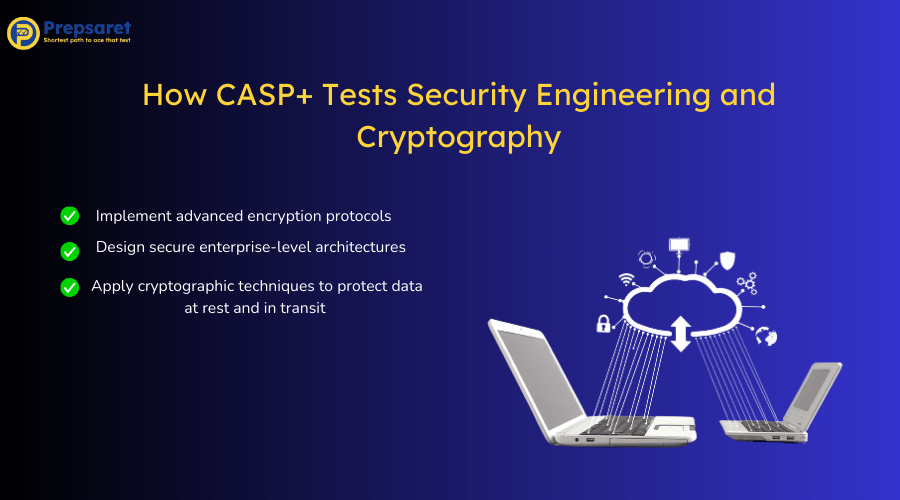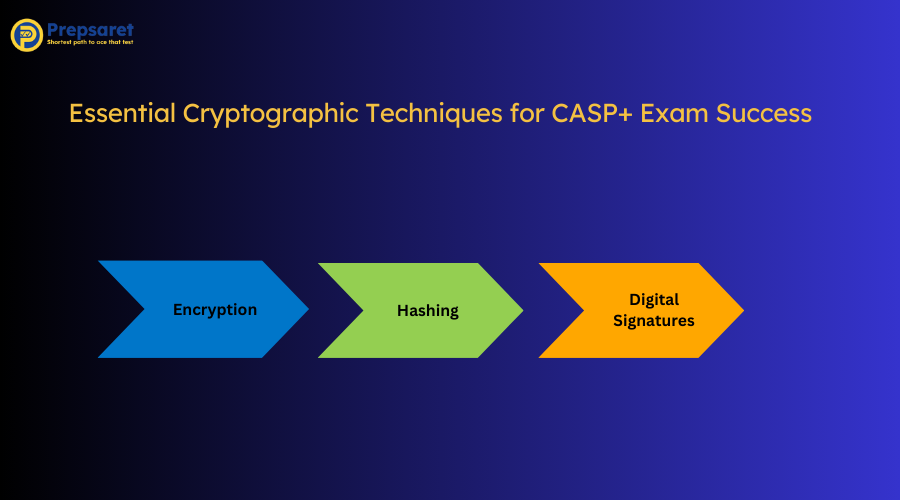CompTIA CASP+ Domains Breakdown
If you’re a cybersecurity professional looking to prove your expertise in advanced security, risk management, and enterprise solutions, the CompTIA Advanced Security Practitioner (CASP+) certification might be your golden ticket.
Unlike entry-level certs that focus on fundamental knowledge, CASP+ is all about hands-on, performance-based skills for designing and implementing security solutions in complex enterprise environments.
So, what makes CASP+ stand out? Unlike CISSP, which is more management-focused, or CEH, which dives deep into ethical hacking, CASP+ is the perfect blend of security strategy and hands-on technical expertise.
It covers four key domains, each critical to mastering cybersecurity at an advanced level. The CASP+ exam domains ensure candidates have deep technical knowledge and practical skills to tackle real-world cybersecurity challenges.
If you’re preparing for the exam, a CASP+ Study Guide PDF from Prepsaret or the CASP CAS-004 study guide PDF can be invaluable resources to help you master these domains. Let’s break them down!
Domain 1: Security Architecture – Understanding Enterprise Security Solutions
Security architecture is the foundation of any secure enterprise. Think of it as designing a fortress that not only protects your valuable data but also aligns with business objectives. This domain focuses on:
- Secure system design – How to build resilient IT infrastructures.
- Network security – Securing data flow within and outside the organization.
- Identity and access management (IAM) – Ensuring the right people access the right resources.
- Zero Trust and defense-in-depth strategies – Multi-layered security approaches.
For a deeper understanding, you can refer to the CASP+ certification domains in the CASP objectives PDF, which provide a structured outline of the topics covered.
Security Architecture vs. Security Operations: What’s the Difference?
Ever wondered how security architecture differs from security operations? Here’s a simple analogy:
- Security architecture is like designing a secure building. It involves planning and structuring security frameworks.
- Security operations is like maintaining and monitoring the building, ensuring its security measures work effectively.
Real-world example? A CISO (Chief Information Security Officer) oversees security architecture, while a SOC (Security Operations Center) analyst actively monitors and responds to threats.
Domain 2: Security Operations – Implementing Advanced Security Measures
If security architecture lays the groundwork, security operations bring it to life. This domain covers the real-world application of cybersecurity measures, ensuring systems remain secure in day-to-day operations. It includes:
- Security monitoring – Detecting and responding to threats in real-time.
- Incident response – Handling and mitigating cyber incidents.
- Vulnerability management – Identifying and fixing security weaknesses before attackers exploit them.
- Compliance and risk management – Adhering to regulations like GDPR, HIPAA, or NIST frameworks.
Security operations keep businesses running safely and smoothly, minimizing the impact of cyber threats and ensuring compliance with industry standards.
For hands-on practice, CASP+ practice questions can help reinforce knowledge and test your understanding of this domain.
Domain 3: Security Engineering and Cryptography – Securing Enterprise Systems
What is Security Engineering?
Security engineering is all about designing resilient security solutions that protect enterprise systems from cyber threats.
Think of it as building an impenetrable digital fortress! It involves identifying vulnerabilities, implementing robust security measures, and ensuring data remains protected from unauthorized access.
The Role of Cryptography in Enterprise Security
Cryptography is the secret sauce behind secure communication. It helps keep sensitive data safe from cybercriminals through techniques like encryption, hashing, and digital signatures.
Whether it’s securing email communication, protecting stored data, or verifying identities, cryptography plays a vital role in modern cybersecurity.
How CASP+ Tests Security Engineering and Cryptography

The CompTIA CASP+ exam objectives evaluate your ability to:
- Implement advanced encryption protocols.
- Design secure enterprise-level architectures.
- Apply cryptographic techniques to protect data at rest and in transit.
- Troubleshoot security weaknesses in complex environments.
To ace this domain, you’ll need to think like a cybersecurity architect—analyzing risks, choosing the right cryptographic tools, and designing security solutions that withstand cyberattacks.
If you’re looking for structured materials, the CAS-004 exam objectives and CASP+ Study Guide PDF can provide a roadmap for success.
Find out: Is CompTIA CASP+ Worth It for Cybersecurity Professionals?
Essential Cryptographic Techniques for CASP+ Exam Success

Understanding cryptographic techniques is crucial for passing the CASP+ exam. Here are the key concepts you need to master:
- Encryption
- Hashing
- SHA-256, MD5 (though MD5 is outdated and insecure)
- Purpose: Ensuring data integrity
- Digital Signatures
- Provides authentication and non-repudiation
- Uses asymmetric encryption techniques
Commonly Tested Cryptographic Protocols
- TLS/SSL – Secure web communication
- IPSec – Secure network traffic
- PKI (Public Key Infrastructure) – Certificate-based authentication
Best Practices for Cryptographic Security
- Use strong encryption algorithms (avoid weak ones like DES and MD5).
- Rotate encryption keys regularly.
- Ensure proper key management and storage (no storing keys in plain text!).
- Implement multi-factor authentication (MFA) to enhance security.
Domain 4: Governance, Risk, and Compliance (GRC) – Managing Security Frameworks
What is GRC, and Why Does It Matter?
Governance, Risk, and Compliance (GRC) is a framework that helps organizations align cybersecurity strategies with business goals. Security professionals need to balance risk management, legal compliance, and security governance to protect organizations from data breaches and regulatory penalties.
Risk Management Frameworks You Need to Know
In CASP+, you’ll be tested on various risk management frameworks, including:
- NIST Cybersecurity Framework – Used widely in the U.S. for cybersecurity risk management.
- ISO 27001 – International standard for managing information security.
- COBIT (Control Objectives for Information and Related Technologies) – A framework for IT governance and compliance.
Each of these frameworks helps organizations identify, assess, and mitigate risks while ensuring compliance with legal and regulatory standards.
Exam Costs and Career Prospects
If you’re considering taking the CASP+ exam, it’s important to factor in the CompTIA CASP+ exam cost, which varies based on location and available discounts. Investing in CASP+ certification can open doors to lucrative career opportunities.
The CompTIA CASP+ salary range depends on experience, industry, and location, but certified professionals often command competitive salaries due to the high demand for cybersecurity expertise.
For those preparing for the exam, using resources like the CompTIA CASP+ domains breakdown PDF and CASP CAS-004 study guide PDF can help ensure success.
What is Risk Assessment?
Risk assessment is the process of identifying potential threats, evaluating their impact, and determining how to mitigate them. It’s a key element of cybersecurity governance and a crucial topic covered in the CASP+ certification syllabus.
Understanding risk assessment is essential for passing the CASP+ exam topics related to governance, risk, and compliance.
Best Practices for Conducting Risk Assessments
When preparing for the CompTIA CASP+ domains, especially those focused on enterprise security and risk analysis, mastering these best practices is essential:
- Identify Assets & Threats – What are you protecting, and what are the potential risks?
- Assess Vulnerabilities – Conduct penetration tests and vulnerability scans, a key area in the CASP+ domains and objectives.
- Determine Risk Impact – Use qualitative and quantitative risk analysis techniques, topics covered in the CompTIA CASP+ study guide.
- Develop Risk Mitigation Strategies – Implement security controls based on risk levels.
- Monitor & Review Regularly – Risk assessment isn’t a one-time event; it’s a continuous process aligned with the CASP+ exam structure.
Real-World Examples of Risk Assessment
A solid understanding of CASP+ exam topics like risk assessment is critical for real-world applications, including:
- A financial institution conducting risk assessments to protect customer data from phishing attacks.
- A healthcare provider ensuring compliance with HIPAA through security evaluations.
- A tech company mitigating insider threats and access control vulnerabilities, a key aspect of the breakdown of CASP+ certification exam domains.
Key Skills Required for CompTIA CASP+ Certification

If you’re considering the CASP+ exam content breakdown, you’ll need expertise in:
- Enterprise Security – Managing large-scale security solutions and architectures.
- Risk Analysis – Conducting assessments, identifying vulnerabilities, and implementing risk controls.
- Cryptography – Applying encryption, digital signatures, and secure communication methods.
- Incident Response – Detecting, analyzing, and mitigating security threats.
These topics are directly aligned with CompTIA CASP+ domains explained in the certification syllabus.
Check this out: Try CompTIA CASP+ Free Questions
Preparing for the CASP+ Exam: Study Resources and Tips

To pass the CASP+ exam structure, you need a strategic study plan. Here’s how to approach how to study for CASP+ exam domains effectively:
Best Study Resources:
- Official CASP+ Study Guide – Covers all CASP+ domains and objectives comprehensively.
- Practice Exams – Essential for understanding the detailed analysis of CASP+ exam topics.
- Hands-On Labs – Gain experience with security configurations and risk analysis.
- Online Courses & Tutorials – Prepsaret’s CompTIA CASP+ Prep Course offer in-depth lessons and practice exams.
Study Plan for Success:
- Weeks 1-2: Read the CompTIA CASP+ study guide and take notes.
- Weeks 3-4: Watch video tutorials and practice hands-on labs.
- Weeks 5-6: Take practice exams and refine weak areas.
- Week 7: Final revision of the CASP+ certification syllabus before the exam.
Read on: How to Prepare for the CompTIA CASP+ Exam
How CompTIA CASP+ Compares to Other Cybersecurity Certifications
Understanding what are the CompTIA CASP+ domains? helps you compare it to other certifications:
| Certification | Focus Area | Hands-On Approach | Best For |
| CASP+ | Enterprise Security, Risk Management, Incident Response | ✅ Yes | Security Architects, Technical Leads |
| CISSP | Security Management, Governance, Risk & Compliance | ❌ No | IT Managers, CISOs |
| CEH | Ethical Hacking, Penetration Testing | ✅ Yes | Penetration Testers, Ethical Hackers |
| CISM | Information Security Management, Governance | ❌ No | Security Managers, Risk Officers |
Why Choose CASP+?
- Emphasizes practical skills, unlike CISSP or CISM.
- Covers CASP+ domains and objectives in a vendor-neutral format.
- Ideal for professionals who want to stay in technical security roles.
Related post: CompTIA CASP+ vs CISSP: Which is Better?
Final Thoughts on Mastering CompTIA CASP+ Domains
Earning the CASP+ certification proves your ability to manage real-world cybersecurity challenges. Here’s a quick recap:
- Master enterprise security, risk analysis, and incident response, key areas in the CASP+ exam content breakdown.
- Follow a structured study plan using the official CompTIA CASP+ study guide.
- Understand the CASP+ domains and objectives to align your study efforts.
If you’re ready to take your cybersecurity career to the next level, start preparing today. With the right approach, you can pass the CASP+ certification syllabus and become a top-tier cybersecurity professional!
The CASP+ certification is a valuable credential for advanced cybersecurity professionals looking to demonstrate hands-on expertise.
By mastering the CASP+ exam domains and leveraging resources like CASP+ practice questions, you’ll be well-prepared to tackle the challenges of today’s cybersecurity landscape.
Whether you’re studying through a CASP+ Study Guide PDF or reviewing the CompTIA CASP+ exam objectives, a strategic approach will set you up for success.
FAQs
How Many Domains Are in CompTIA Security+?
The CompTIA Security+ certification exam consists of five domains. These include General Security Concepts, Threats, Vulnerabilities, and Mitigations, Security Architecture, Security Operations, and Security Program Management and Oversight.
Each domain focuses on specific areas of cybersecurity expertise, such as foundational security principles, identifying and mitigating threats, designing secure architectures, managing security operations, and overseeing security programs.
Together, these domains ensure a comprehensive understanding of essential cybersecurity concepts and practices.
What is The Format of the CASP+ Exam?
The CASP+ exam, or CompTIA Advanced Security Practitioner exam, consists of a maximum of 90 questions, combining multiple-choice and performance-based formats.
Candidates have 165 minutes to complete the test, which is scored as pass/fail without a scaled score. The exam can be taken online or in-person at authorized centers, and it is designed for experienced cybersecurity professionals with significant IT security experience.
What is The Average Salary for CASP+?
The average salary for professionals with a CASP+ certification varies significantly based on experience and job role.
Generally, entry-level positions earn between $80,000 and $90,000 annually, while mid-career professionals can expect $90,000 to $115,000.
Senior roles may command salaries from $115,000 to $140,000 or higher. Overall, the average salary for CASP+ holders in the U.S. is approximately $123,590.
Which is the Hardest CompTIA Exam?
The hardest CompTIA exam is the CompTIA Advanced Security Practitioner (CASP+). This certification is designed for experienced IT professionals and covers advanced security topics, including enterprise security architecture and risk management.
The exam features complex performance-based questions that require practical skills, making it particularly challenging. Candidates must achieve a passing score of 750 out of 900, reflecting its rigorous standards and depth of knowledge required.
Is CySA Higher Than CASP?
CySA+ is not higher than CASP+. CySA+ (CompTIA Cybersecurity Analyst) is an intermediate-level certification designed for cybersecurity analysts, focusing on security operations and incident response.
In contrast, CASP+ (CompTIA Advanced Security Practitioner) is an advanced-level certification aimed at experienced professionals responsible for implementing and managing security solutions across complex environments.
Therefore, CASP+ requires more extensive experience and knowledge than CySA+.

